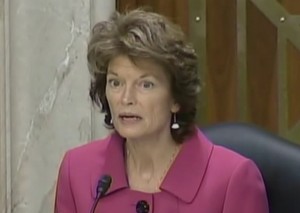
U.S. Senator Lisa Murkowski, R-Alaska, Chairman of the Interior Appropriations subcommittee, today criticized the Interior Department’s $12.1 billion budget proposal for programs within the subcommittee’s jurisdiction– including the over $1 billion increase – for ignoring the statutory caps placed on Congress by the Budget Control Act. Senator Murkowski also pressed Interior Secretary Sally Jewell on a number of issues important to Alaska: Arctic infrastructure, offshore oil development, revenue sharing, tribal courts and the administration’s commitment to Alaska’s coastal communities.
“Your budget proposes new spending as if we had already lifted sequestration,” Murkowski told Interior Secretary Sally Jewell at Wednesday’s hearing of the Interior and Appropriations Subcommittee. “That amounts to wishful thinking, not responsible governance.”
“Your approach conveniently avoids the tough choices that must be made between programs in the constrained fiscal environment in which we’re operating,” Murkowski said. “In all likelihood, we will have roughly the same amount to spend this year as we did last year under the budget caps, yet you have proposed $1.4 billion above that level. This subcommittee is forced to make very difficult choices in how to prioritize among the many programs in this bill, and your budget does not help by giving us guidance as to programs the administration sees as a priority.”
Senator Murkowski raised with Secretary Jewell a number of issues important to Alaska’s economic and cultural future, including the more than 22 million acres the administration has withdrawn from energy development in recent weeks.
“This has occurred on top of many other restrictions and regulations being imposed on us. These withdrawals have occurred despite the tremendous energy potential in those areas, despite the pressing need to refill our pipeline, and despite strong opposition from most Alaskans,” Senator Murkowski said. “These actions have the potential to do enormous damage to my state.”
Senator Murkowski said many of the proposals contained within the Interior budget would further harm Alaska’s ability to provide public services and threaten to cause the shutdown of the trans-Alaska oil pipeline.
“Stunningly, when oil prices have fallen dramatically, the department indicates that it will propose a host of new fees and royalty rate increases on energy producers that will exceed $2.5 billion. Energy producers are already fleeing public lands because of regulatory headaches and permitting delays – I don’t see how making it more expensive to do business on public lands is sound policy or good for the United States Treasury,” Senator Murkowski said.
Turning to the Arctic and the Obama administration’s Arctic plan, Senator Murkowski asked Secretary Jewell whether they had developed a point person for Alaskans to work with who is spearheading efforts on behalf of the DOI – expressing frustration that “since many agencies have a role in the Arctic, nobody has ownership over it.”
Jewell responded that they have a designated representative who is working at the State Department to implement the Interior Department’s policies in the Arctic, and that her Chief of Staff – Tommy Boudreau, an Alaskan himself – would be the best person to continue working with the Alaska delegation.
Senator Murkowski also questioned Secretary Jewell’s highly-publicized $8 million commitment to help the Alaskan village of Kivalina explore relocation options due to rising sea levels. Sharing that Northwest Arctic Borough community leaders told Murkowski they found the amount “laughable,” the Senator pressed Jewell for answers on how the 2016 budget helps the community develop an emergency evacuation route. Jewell acknowledged that there was insufficient money in the 2016 budget to help Kivalina.
Senator Murkowski later revisited the issue of tribal court funding with Secretary Jewell, in light of testimony provided to her by Bureau of Indian Affairs Assistant Secretary Brian Washburn last week. In the 2015 spending bill, Murkowski inserted binding language requiring the BIA to produce a report looking into the budgetary needs of tribal courts in states like Alaska that currently do not receive such funds by June 14, 2015 – but Washburn’s response raised concerns that the agency was shirking this legal obligation when he said he would work on a report but that it wasn’t legally required.
Murkowski told Jewell she wanted to make sure that the “letter and the spirit of the law are being adhered to” because tribal courts are a big priority for Alaska. In response, Secretary Jewell nodded and committed to working with the subcommittee to deliver on this needed information.
Senator Murkowski also pressed Secretary Jewell on the unresolved access issue at King Cove, Alaska – pointing out that there have been two more emergency medical evacuations since Jewell testified before the Senate Energy and Natural Resources Committee on Feb. 24.
“Last Monday marked 14 long months since the rejection of the necessary, life-saving road – yet, again, we see nothing in this budget request to help those whose lives are in needless danger,” Murkowski said. “There were two more medevacs out of King Cove since our last meeting Secretary Jewell, including one instance where the U.S. Coast Guard was unable to come in an emergency.”
There have been seven medevacs this year alone, and 23 total since Secretary Jewell blocked a land exchange in 2013 that would have provided the community with reliable access to medical care in emergency situations. Over the past 30 years, at least 19 deaths have been attributed to the lack of a road, either because of plane crashes or residents’ inability to reach medical treatment in time.
Senator Murkowski said she would do everything in her power as the chairman of the Energy and Natural Resources Committee and chairman of the Interior subcommittee to fight these “wrongheaded proposals.”
